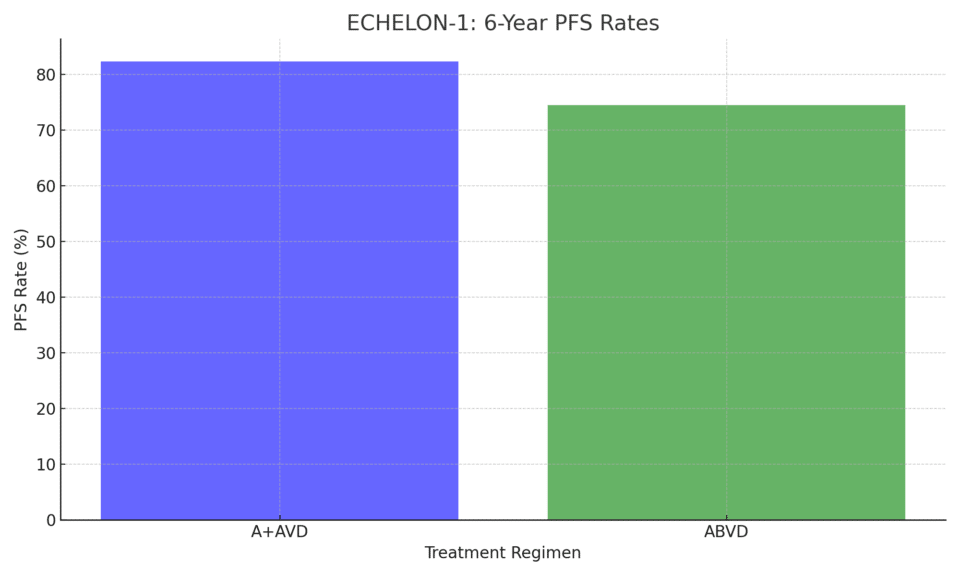The field of oncology is witnessing a paradigm shift in the treatment of lymphomas, fueled by the emergence of groundbreaking studies and novel therapeutic agents. This detailed review, drawing from a presentation by Elizabeth Brem, MD, at the University of California, Irvine, delves into the significant strides made in Hodgkin lymphoma (HL) and diffuse large B-cell lymphoma (DLBCL) treatment. It examines pivotal trials, compares therapeutic strategies, and discusses their implications for current clinical practice, offering oncologists a roadmap for integrating these innovations into patient care.
Hodgkin Lymphoma: Evolving Standards and New Horizons
Revisiting ECHELON-1: A Benchmark in HL Treatment
The ECHELON-1 trial, with its extended follow-up of six years, marks a cornerstone in HL therapy, challenging the traditional use of ABVD. The study’s comparison of A+AVD against ABVD showcased a significant prolongation in progression-free survival (PFS) favoring A+AVD, with estimated 6-year PFS rates of 82.3% versus 74.5%, respectively. The hazard ratio of 0.68 underscores the enhanced efficacy of A+AVD, making a compelling case for its adoption as a new standard of care (SOC) in specific patient populations.

The Impact of SWOG S1826: Nivolumab’s Role in Advanced HL
The SWOG S1826 trial further accentuates the shift towards integrating immunotherapeutics in HL management. By comparing nivolumab-AVD to brentuximab vedotin-AVD in advanced-stage classical Hodgkin lymphoma, this study not only reinforced the clinical benefit observed in ECHELON-1 but also highlighted the potential for improved outcomes with immunotherapy-based regimens. The trial’s outcomes suggest a reevaluation of SOC, emphasizing the role of immunotherapeutic agents in enhancing patient survival and quality of life.
Diffuse Large B-Cell Lymphoma: Therapeutic Innovations and Clinical Implications
POLARIX Trial: Setting a New Benchmark with Polatuzumab Vedotin-R-CHP
In the landscape of DLBCL treatment, the POLARIX trial represents a significant advancement, introducing polatuzumab vedotin-R-CHP as a superior alternative to the well-established R-CHOP regimen. This phase III randomized double-blind international study not only demonstrated an improvement in PFS but also sparked a discussion on the recalibration of SOC in DLBCL. The findings from POLARIX are instrumental in guiding oncologists toward more effective and tailored treatment strategies for their patients.
The Emergence of Bispecific Antibodies
The advent of bispecific antibodies marks a breakthrough in DLBCL therapy, offering a novel approach to targeting cancer cells. Despite the promise these agents hold, their optimal integration into treatment algorithms remains a subject of ongoing research. Current clinical trials are pivotal in determining their efficacy, safety profile, and place in therapy, especially in comparison to established treatments. The decisions surrounding their use will likely be influenced by individual patient characteristics, underscoring the importance of personalized medicine in oncology.
Clinical Practice Implications
N-AVD: A Potential New Standard in Hodgkin Lymphoma
The compelling evidence from ECHELON-1 and SWOG S1826 trials supports the transition towards N-AVD as a preferred treatment for advanced-stage HL, given its superior PFS and manageable side effect profile. These findings suggest a paradigm shift in HL treatment, advocating for the integration of newer, targeted therapies over traditional chemotherapy regimens. Oncologists are encouraged to consider these developments in their clinical decision-making, tailoring treatment plans to leverage these advancements for optimal patient outcomes.
DLBCL Treatment: Navigating the Future
The introduction of polatuzumab vedotin-R-CHP and the exploration of bispecific antibodies herald a new era in DLBCL management. These innovations offer the potential for improved therapeutic efficacy and patient survival, challenging the conventional reliance on R-CHOP. As the treatment landscape evolves, oncologists must remain informed about the latest evidence and clinical trials to refine their therapeutic strategies, ensuring that patients receive the most effective and personalized care possible.
Conclusion
The ongoing advancements in the treatment of lymphomas, particularly Hodgkin lymphoma and diffuse large B-cell lymphoma, represent a significant shift towards more effective and personalized therapeutic approaches. The integration of novel agents such as brentuximab vedotin, nivolumab, polatuzumab vedotin, and bispecific antibodies into clinical practice is reshaping the management of these malignancies. Oncologists are at the forefront of this transformation, tasked with the critical role of incorporating these developments into patient care to enhance outcomes and quality of life. As research continues to push the boundaries of what is possible in oncology, staying abreast of these changes will be paramount